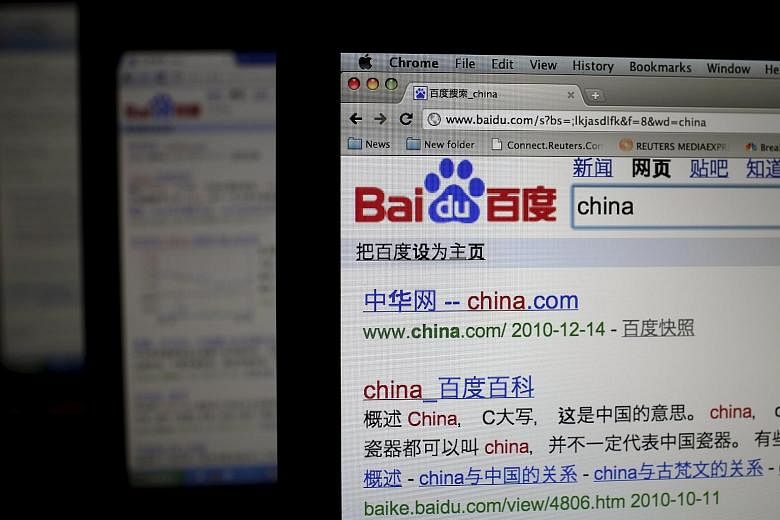BEIJING • China's Internet regulator is investigating Baidu after the death of a student who sought a cancer cure on the Chinese search giant, prompting a barrage of criticism for prioritising paid search results.
Mr Wei Zexi, 21, had already been diagnosed as having a terminal soft tissue disease when his family found an experimental immunotherapy treatment at a Beijing hospital run by the armed police force via a Baidu search.
Mr Wei spent more than 200,000 yuan (S$41,500) on the therapy but it failed, he said in a posting on zhihu.com, a Chinese question-and-answer forum, in February. He had borrowed money to cover his costs.
He accused the hospital of exaggerating the treatment's efficacy and accused Baidu of ranking medical information search results by the amount paid by advertisers, denouncing it as "evil" and warning other cancer patients "not to be cheated".
Baidu says it differentiates paid entries in its search results. But amid mounting public anger, the Cyberspace Administration of China said in a statement that it has launched a joint investigation with the country's health authorities and business regulator into Baidu.
The company's shares fell by the most in nine months on news of the probe, shedding 7.9 per cent on Monday. Its chief executive, Mr Robin Li, has been asked by the Internet regulator to answer queries, the Economic Information Daily, which is owned by the official Xinhua news agency, yesterday quoted sources as saying.
Baidu said it "welcomed" the probe and would "fully cooperate" with investigators. It said on its Weibo account that the hospital Mr Wei used was top-tier and had provided the search engine with proper certification.
China's health authority announced yesterday that it, the military and armed police were jointly probing the Second Hospital of Beijing Armed Police Corps, where Mr Wei was treated.
Private healthcare firms from Putian in the eastern province of Fujian - which have a reputation for over-prescription and false advertising - are believed to have links with the hospital, media reports said.
Local governments have no authority to supervise hospitals run by the military and armed police, making them especially appealing to unscrupulous third-party service providers - especially since patients trust public health facilities more than private ones.
The People's Liberation Army and armed police have significant business interests. But in March, the authorities ordered them to stop providing "paid services", which could eliminate such hospital contracts.
Baidu is often seen as China's equivalent of Google - although the US firm is hardly a direct competitor as it is blocked on the mainland and terminated most of its operations in 2010 after controversy over the country's online controls.
Search services accounted for nearly 84 per cent of Baidu's total revenues last year, its annual report showed. Most of the business came from customers "who pay us a fee based on click-throughs for priority placement of their links in the search results", it said.
Baidu's lucrative online marketing business has been hugely controversial. The company came under fire earlier this year for selling the right to manage an online haemophilia forum to an unlicensed private hospital.
The hospital used the platform for self-promotion and deleted comments that challenged its credentials, Xinhua said on Monday.
In 2011, Baidu was forced to apologise after China's state television reported about fraudulent advertisements on its platforms that ranged from phoney airline tickets to unlicensed pharmaceutical advertisements.
AGENCE FRANCE-PRESSE, BLOOMBERG

